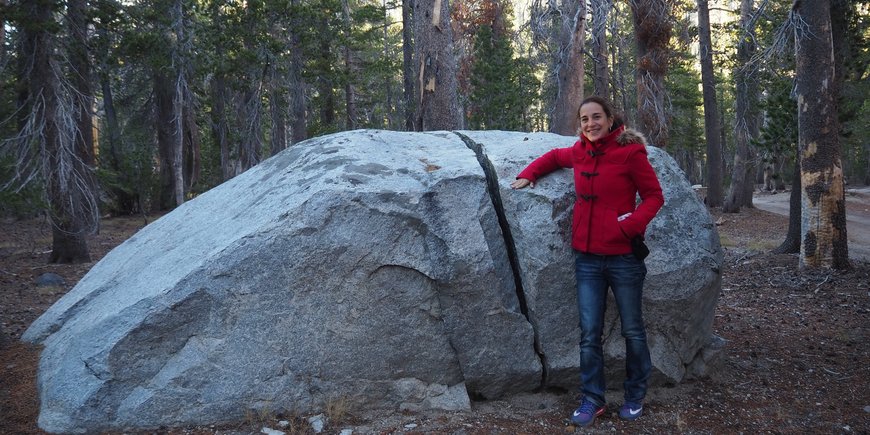Dr. Patricia Martinez-Garzon wins ERC Starting Grant. The prestigious grant helps excellent younger scientists, who have 2 to 7 years’ experience after their PhDs, to launch their own projects, form their teams and pursue their most promising ideas.
Dr. Patricia Martinez-Garzon project QUAKE-HUNTER will address the topic of whether earthquakes show a precursory nucleation process, which is a longstanding question in geoscience that remains of high importance until today. The project aims at determining the most effective monitoring approaches to detect fault-related transient signals that sometimes precede moderate to large earthquakes, as well as to infer from them the fault conditions under which these earthquake initiation processes emerge. “These processes are more and more frequently observed in laboratory experiments but capturing them in nature remains a challenge” says Patricia.
QUAKE-HUNTER will explore different methodologies based on a combination of supervised and unsupervised machine learning to identify retrospectively earthquake nucleation processes for active faults near earthquake-threatened urban areas. The ultimate goal will be to test the performance of this novel methodology in real time.
The project is designed to be high transferable to different environments, and an important area will be north-western Turkiye, where the North Anatolian Fault is overdue for a magnitude M>7 earthquake directly adjacent to the Istanbul megalopolis with its >15M inhabitants. “As scientist, we need to prepare for it, and we need to start now” says Patricia. The recent drastic multi-instrument improvements in the monitoring as well as the societal relevance represent a unique opportunity to tackle the proposed research.
In this region, seismic signatures have been previously observed preceding the last major earthquake, the MW 7.4 Izmit 1999 earthquake which caused almost 20.000 fatalities. More recently, seismic and transient signatures have been observed preceding also smaller mainshocks (4.5 < M < 5.8, Malin et al, 2018; Durand et al 2020), thanks to the special borehole seismometer and strainmeter instruments. These special instruments are part of the GONAF Plate Boundary Observatory, which is operated by the GFZ German Research Centre for Geosciences, in collaboration with the Turkish Disaster and Emergency Management Presidency (AFAD) and the UNAVCO institute from US.
About the ERC Grant
The ERC, set up by the European Union in 2007, is the premier European funding organisation for excellent frontier research. It funds creative researchers of any nationality and age, to run projects based across Europe. The ERC offers four core grant schemes: Starting Grants, Consolidator Grants, Advanced Grants and Synergy Grants. With its additional Proof of Concept Grant scheme, the ERC helps grantees to bridge the gap between their pioneering research and early phases of its commercialisation. The ERC is led by an independent governing body, the Scientific Council. The overall ERC budget from 2021 to 2027 is more than €16 billion, as part of the Horizon Europe programme.









![[Translate to English:] Torsten Sachs in front of a climate station on a field](/fileadmin/_processed_/3/9/csm__TorstenSachs_bearbeitet_GS_4a1365ef84.jpeg)

![[Translate to English:] left image flood at the Ahrtal: image from above, several houses are flooded; left image:: Heidi Kreibich;](/fileadmin/_processed_/4/4/csm_Bild2_9af0130e9f.png)



![[Translate to English:] Start der Vega Rakete](/fileadmin/_processed_/6/4/csm_20231201-kachel_Vega-VV23-launch_ESA-CNES-Arianespace_706716b68c.jpeg)









![[Translate to English:] Poster exhibition at the Brandenburg Hydrogen Day at the GFZ, some participants in the foreground](/fileadmin/_processed_/6/5/csm_Erster_Brandenburgischer_Wasserstofftag_GFZ_402fcec95e.jpeg)
![[Translate to English:] Group picture of the participants](/fileadmin/_processed_/9/4/csm_20231108_CAWa-Workshop-Tashkent_Gruppenbild_99ea779d8a.jpeg)

![[Translate to English:] [Translate to English:] Hörsaal](/fileadmin/_processed_/e/6/csm_H%C3%B6rsal_e21ac645fb.jpeg)


![[Translate to English:] The Delegations in the Historic Library on the Telegrafenberg. In the back there are from left to right, the Dutch Ambassador for Germany, Ronald van Roeden, the Dutch Minister for Education, Culture and Science, Robbert Dijkgraaf and the scientific director of the GFZ, Susanne Buiter.](/fileadmin/_processed_/d/b/csm_Kachel-2_9eba4b4212.jpeg)

